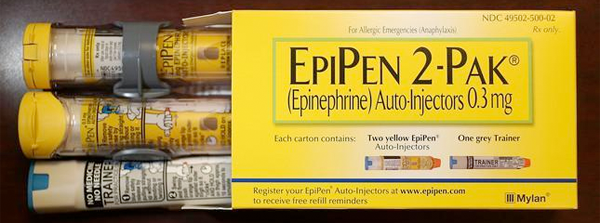Blog
Commentary: EpiPen why we need Prop. 61

If there’s symbol of why California needs Proposition 61, it’s EpiPen.
Drug prices have sparked broad national outrage. A September poll found 82 percent of Americans want Medicare to have the power to negotiate lower prices.
Congress has repeatedly blocked such proposals, a testament to outsized influence of the pharmaceutical industry, which has spent $3.4 billion in federal lobbying since 1998.
That can be seen in California as well. This year alone pharmaceutical lobbying killed two bills, SB 1010 and AB 463, both of which would have just provided more transparency on charges without even cutting prices.
One agency that does have the ability to demand lower drug prices is the Department of Veterans Affairs.
That’s why Prop. 61 uses the common-sense approach of directing the state to pay no more than the same prices paid by the VA. That could cut prices by up to 40 percent, and produce billions in savings for California taxpayers.
Nurses see the effects of inflated drug prices every day. Parents who risk homelessness to continue paying for medications for children with serious illnesses.
Diabetic patients who can’t afford the skyrocketing costs of insulin coming into the hospital with elevated blood glucose levels or facing blindness, kidney or liver damage or loss of limbs.
Patients with heart stents who can’t afford the follow-up drugs to prevent blood clots in the new stent.
Then there’s the EpiPen, a staple for families for years. It’s used to deliver epinephrine to block potentially fatal allergic reactions to bee stings, peanuts, shellfish or other common triggers.
After Mylan acquired EpPen in 2007, it steadily jacked up the price by 461 percent, from $57 to $600 or more by this year for a two pack even though there’s just $1 worth of epinephrine in each pen.
The medicine in the pens typically expires every year, adding to the cost burden for families with high deductible insurance plans.
Concurrently, Mylan CEO Heather Bresch got a 671 percent raise to $18.9 million in 2015, and the company created a special incentive plan for other executives based on its profiteering. Mylan’s gross profit margin on EpiPens in the U.S. hit an estimated 75 percent last year alone.
Though EpiPen is the most notorious, it is hardly an outlier. Cancer drug prices, which averaged in the $5,000 range in 2000 had soared to more than $100,000 by 2012. Biogen Idec’s multiple sclerosis drug, Tecfidera, sells for $54,900 annually. Vertex Pharmaceuticals’ cystic fibrosis drug, $259,000 a year.
Sovaldi, at $1,000 a pill or $84,000 for a 12-week course of treatment for hepatitis C, may be even more infamous. Sovaldi is so expensive that states who cover Medicaid patients have had to ration access to the drug because of the prohibitive cost at enormous harm to patients.
It doesn’t have to be this way. The U.S. has by far the highest drug prices in the world. Need proof? The $600 EpiPen two-pack sells for just $69 in Great Britain and less than $100 in France.
Taxpayers subsidize much of the cost for pharmaceutical research and development, typically conducted at public universities while nearly all the drug giants spend far more on marketing than for developing new drugs.
The pharmaceutical giants know what’s at stake and are fearful that we will set a national model. That’s why they are spending up to $100 million to deceive voters about Prop. 61.
The drug companies are not about to leave the lucrative California market and all the public shaming has yet to produce reformed behavior by an out-of-control industry.
It’s long past time to send a message to the arrogant pharmaceutical CEOs and companies. Join nurses by voting yes on Prop. 61.
Zenei Cortez is a registered nurse and co-president of the California Nurses Association/National Nurses United.
Original post: http://www.eastbaytimes.com/2016/10/03/commentary-epipen-why-we-need-prop-61/